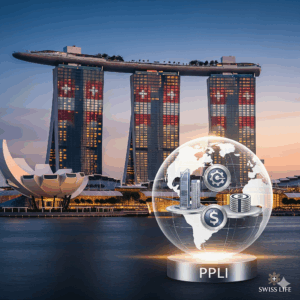Swiss Life Singapore’s Private Placement Life Insurance (PPLI) offers high-net-worth investors tax efficiency, flexible global investment options, and estate planning advantages.
However, the company was previously linked to a US investigation into offshore tax compliance, raising questions about transparency and risk.
This review covers how Swiss Life PPLI works, its advantages, disadvantages, and whether it can still be a good fit for HNWIs today.
My contact details are hello@adamfayed.com and WhatsApp +44-7393-450-837 if you have any questions.
The information in this article is for general guidance only. It does not constitute financial, legal, or tax advice, and is not a recommendation or solicitation to invest. Some facts may have changed since the time of writing.

What Is Swiss Life Private Placement Life Insurance (PPLI)?
Swiss Life, one of Europe’s oldest insurers founded in 1857, offers Private Placement Life Insurance (PPLI) through its Singapore office.
Swiss Life officially launched Swiss Life (Singapore) Pte. Ltd. around April 2008 to expand its private placement life insurance offerings in the Asia-Pacific region.
What is a private placement life insurance policy?
PPLI is an investment-linked insurance wrapper designed for high-net-worth and ultra-high-net-worth individuals (HNWIs/UHNWIs).
PPLI benefits include tax deferral, estate planning, asset protection, and privacy, which are particularly valuable in cross-border or sophisticated planning.
This financial structure allows clients to hold customized investment portfolios.
However, PPLI has drawn attention. A US Senate report in 2024 criticized such structures as tools enabling substantial tax avoidance, suggesting up to US$40 billion in tax-free transfers.
Swiss Life Singapore PPLI Lawsuit

In May 2021, Swiss Life Holding AG and its subsidiaries (including Swiss Life Singapore) entered into a Deferred Prosecution Agreement with the US Department of Justice. The insurer admitted it helped US taxpayers hide assets and income using PPLI structures.
This happened between 2005 and 2014.
Tactics included:
- Concealing beneficial ownership through insurance wrappers.
- Routing assets through third-party accounts.
- Using alternative assets like gold and gemstones inside policies.
Swiss Life agreed to pay about US$77.3 million in penalties, forfeitures, and restitution. By cooperating, disclosing client data, and strengthening compliance, it avoided criminal conviction.
This case highlighted how PPLI can be tainted due to tax evasion, even though it remains a legitimate wealth planning tool when structured correctly.
Other Swiss Life Singapore Regulatory Issues
Beyond the US case, Swiss Life Singapore was fined S$200,000 by the Monetary Authority of Singapore (MAS) in 2023 for Anti-Money Laundering and Countering the Financing of Terrorism lapses.
The issue was linked to a high-risk client’s ownership structure dating back to 2017.
While not as severe as the US case, this shows the importance of robust due diligence in cross-border insurance.
Swiss Life Singapore PPLI Pros and Cons
Pros:
- Backed by Swiss Life’s financial strength.
- Customized for wealthy families, estate planning, and cross-border needs.
- Located in Singapore, a strong global hub with MAS oversight.
Cons:
- History of legal and compliance issues, such as the US DOJ case and MAS fine.
- Potentially high fees and opaque structures.
- Complexity requires specialized advisory and careful oversight.
Is Swiss Life Private Placement Life Insurance Right for You?
Swiss Life Singapore’s PPLI remains a powerful estate and wealth planning tool for HNW and UHNW clients.
However, the 2021 US lawsuit and 2023 MAS fine reveal risks if policies are misused or poorly monitored.
Prospective clients should:
- Engage independent advisors experienced in PPLI and cross-border tax.
- Demand full transparency on fees, costs, and compliance obligations.
- Compare with other PPLI providers, e.g., Luxembourg or Liechtenstein, for better terms or stronger protections.
Used properly, Swiss Life Singapore PPLI can be compliant, tax-efficient, and beneficial. Used improperly, it may invite scrutiny, penalties, or worse.
FAQs
Is Swiss Life a good investment?
The answer depends on whether you mean investing in Swiss Life as a company (shares) or using Swiss Life’s PPLI as an investment vehicle.
Swiss Life shares may be a stable, dividend-paying long-term investment, but subject to sector risks.
Swiss Life PPLI is not an investment in itself but can be an effective wealth structuring tool for HNWIs, provided it is used in a compliant, transparent way.
What is the difference between PPLI and VUL?
The difference between PPLI and VUL is mainly in target market, flexibility, and investment options.
PPLI is a bespoke life insurance for high-net-worth clients, allowing access to hedge funds, private equity, and custom portfolios. VUL is a retail product with limited, pre-selected fund options and lower entry amounts.
What are the investment options for private placement life insurance?
PPLI can hold traditional funds, hedge funds, private equity, real estate, and other alternative assets, depending on jurisdiction and provider rules.
Can you make money from life insurance?
Yes, but mainly through investment-linked policies like PPLI or VUL, where the cash value grows with the chosen portfolio. Pure life insurance does not generate investment returns.
Which life insurance is best for investment?
The answer would always depend on your profile, which means your net worth, goals, tax situation and time horizon.
For high-net-worth individuals, PPLI is generally the best option because of its flexibility, tax efficiency, and estate planning benefits.
For retail investors, VUL or IUL can provide investment growth but with higher fees and limited choices, while whole life suits those who prefer guarantees.
Term life is purely for protection, not investment.
Pained by financial indecision?

Adam is an internationally recognised author on financial matters with over 830million answer views on Quora, a widely sold book on Amazon, and a contributor on Forbes.



